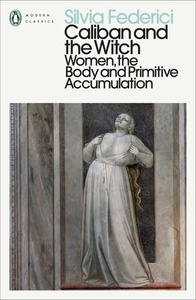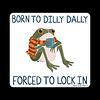Take a photo of a barcode or cover
What a mess of an essay that was... First of all, it would be truer to the content to reverse the order of the title in "primitive accumulation, women and the body", as two thirds of the essay are concerned with the economy of the middles ages. Federici never manages to successfully intertwine her themes to achieve a final product that makes its point based on all the different aspects that were broached: reading 130 pages on how the economy changed in the medieval period didn't enable me to better grasp the witch-hunt, since this chapter does not rely on the demonstrations from the previous chapter.
There is also this very frustrating impression that every chapter is an introduction for the following, with the promise of diving deeper in a subject, while this never happens. On the contrary, instead of diving deeper, Federici at best repeats herself, while sometimes completely contradicting a point made two pages ago (as is the case for her explanation for the end of witch-hunting).
Even more problematic is her tendency to overly quote other works, before bringing her own conclusion without any logic link with the argument made, and without any justification. There are some points that are dubious (she mentions the Great Plague twice, with completely different dates), and uses an unsubstantiated urban legend as the sure etymology of "Faggot". She also tends to turn some issues into complex ones and read some things into it when really, there was nothing much to prove (as with her final chapter, when she spend pages and pages explaining the witch-hunt in Latin America to conclude that all this argumentation could explain the coincidences in representation of witchcraft in Latin America and in Europe : as both representations and accusations were made by Europeans, I don't see why one should even wonder about the similarities?)
A truly disappointing essay that is blotchy, frustrating, and that never actually deals with its subject.
There is also this very frustrating impression that every chapter is an introduction for the following, with the promise of diving deeper in a subject, while this never happens. On the contrary, instead of diving deeper, Federici at best repeats herself, while sometimes completely contradicting a point made two pages ago (as is the case for her explanation for the end of witch-hunting).
Even more problematic is her tendency to overly quote other works, before bringing her own conclusion without any logic link with the argument made, and without any justification. There are some points that are dubious (she mentions the Great Plague twice, with completely different dates), and uses an unsubstantiated urban legend as the sure etymology of "Faggot". She also tends to turn some issues into complex ones and read some things into it when really, there was nothing much to prove (as with her final chapter, when she spend pages and pages explaining the witch-hunt in Latin America to conclude that all this argumentation could explain the coincidences in representation of witchcraft in Latin America and in Europe : as both representations and accusations were made by Europeans, I don't see why one should even wonder about the similarities?)
A truly disappointing essay that is blotchy, frustrating, and that never actually deals with its subject.
challenging
dark
informative
sad
fast-paced
informative
reflective
medium-paced
informative
inspiring
sad
medium-paced
Moderate: Genocide, Rape, Sexism, Sexual violence, Slavery, Violence, Colonisation, War
challenging
dark
informative
slow-paced
On its surface, Caliban and the Witch is either a masterpiece or just shy of one. However, I'm conflicted on the novel - and how to rate it - for a couple reasons. Firstly, the author has shown herself in subsequent releases to be a TERF, and one can see the seeds of that essentialist worldview in the penumbra of Caliban. Secondly, reviews I've seen from academic historians (which Federici is not) have said that many of her most important facts are lacking - the primary examples always being that most estimates say witch hunts killed tens of thousands of people, while Federici relies on the minority historian opinion to arrive at much larger numbers, while also referencing several rumors as truth, such as the existence of prima notca and the etymology of the f-slur - and that she over-relies on sources which supported her initial thesis while dismissing more current historians whose work did not.
All of that said, while I do believe Federici limits the novel's academic value (which is why I'm subtracting half a star) by overstating her case regarding the importance of the witch hunt in the minimizing of "women's work" and women's roles in society during the transition from feudalism to capitalism, I believe the work still holds an important role as a novel. Specifically, the first half of the book goes into detail regarding the historical minimization of women and their legal & social relegation to the service of reproductive labor. Additionally, while witch hunts might not have been the primary tool of social repression, having lived through a couple of a modern-day attempts at reviving the witch hunt in the US, I do not believe the reduction of the victims of witch hunts from a "genocide" to "30,000-50,000 over a couple hundred years" necessitates claiming they had no chilling effect on the social power and lives of women, at least in portions of Europe. Finally, the "Descartes / Foucault Chapter" is one of the more challenging, yet interesting reads I've had in awhile, discussing the societal perception of magic and the body, and how it changed in the transition to capitalism. Therefore, so long as one is willing to read with a skeptical eye, and not valorize the author, there is enough value here to highly recommend.
All of that said, while I do believe Federici limits the novel's academic value (which is why I'm subtracting half a star) by overstating her case regarding the importance of the witch hunt in the minimizing of "women's work" and women's roles in society during the transition from feudalism to capitalism, I believe the work still holds an important role as a novel. Specifically, the first half of the book goes into detail regarding the historical minimization of women and their legal & social relegation to the service of reproductive labor. Additionally, while witch hunts might not have been the primary tool of social repression, having lived through a couple of a modern-day attempts at reviving the witch hunt in the US, I do not believe the reduction of the victims of witch hunts from a "genocide" to "30,000-50,000 over a couple hundred years" necessitates claiming they had no chilling effect on the social power and lives of women, at least in portions of Europe. Finally, the "Descartes / Foucault Chapter" is one of the more challenging, yet interesting reads I've had in awhile, discussing the societal perception of magic and the body, and how it changed in the transition to capitalism. Therefore, so long as one is willing to read with a skeptical eye, and not valorize the author, there is enough value here to highly recommend.
challenging
informative
reflective
medium-paced
challenging
emotional
informative
inspiring
mysterious
reflective
medium-paced
everyone needs to read this. capitalism is built on the back of oppression and this book articulates perfectly a crucial aspect of it that is unseen and overlooked : women’s reproductive health. this was just absolutely amazing, a true masterclass on both talent and intelligence, i find myself invigorated with my own beliefs again and i couldn’t be happier of it with the times that are ahead of us.








